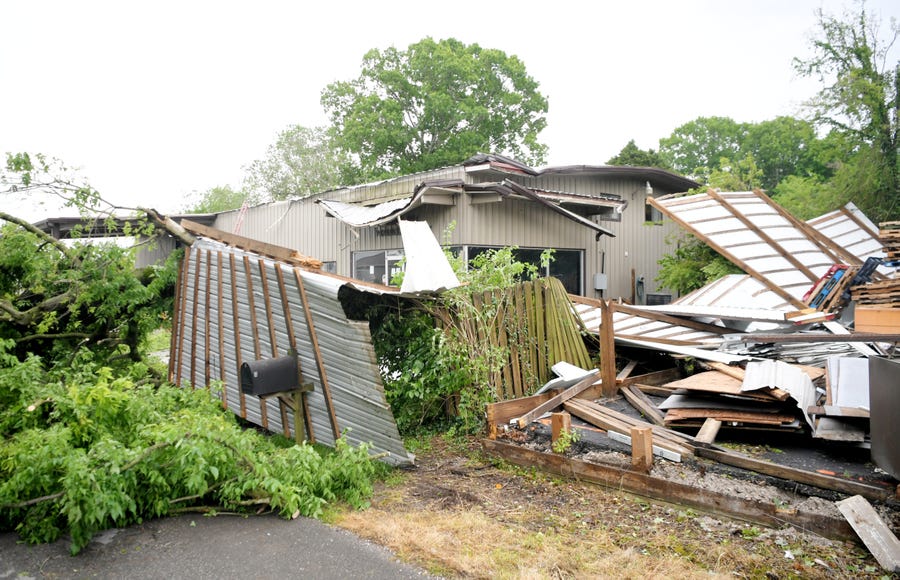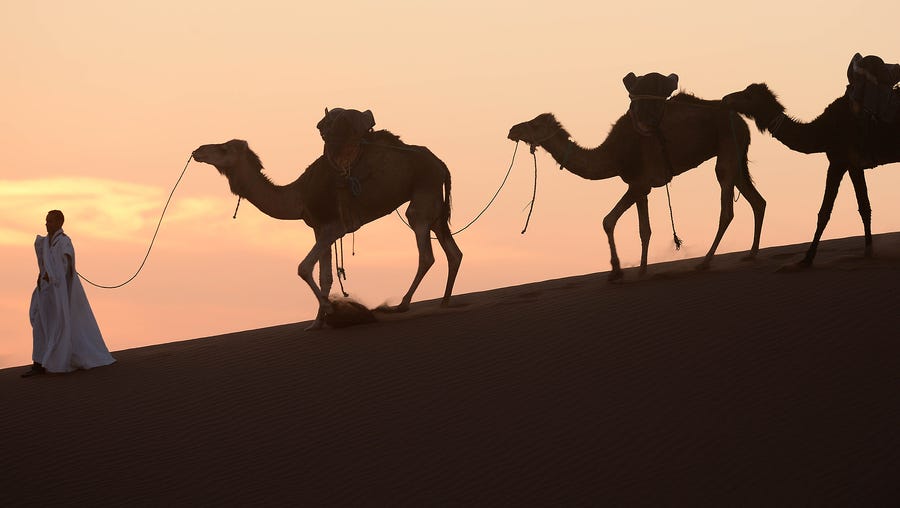 |
| |
| |
| |
| |
| |
| |
| This seems hard to believe, but we're only 125 days into 2020. Can we all just take a moment to look at all the crazy things that have happened this year? A running list: |
| • | The coronavirus pandemic came out of nowhere. | | • | "Murder hornets" were spotted in the USA. | | • | President Donald Trump was acquitted in an impeachment trial. | | • | Fires ravaged Australia, killing hundreds of koalas. | | • | Kobe Bryant, one of the NBA's greatest players, died. | | • | Prince Harry and Duchess Meghan "stepped back" as senior royals. | |
| It's Ashley, and honestly, that list could have been a lot longer, but we have enough to worry about. Now let's talk news, shall we? |
| But first, thank you, teachers: They sent students owl vomit to dissect. They taught parents to read. After schools closed, teachers have reached beyond their training and expertise to do the extraordinary, all for the kids they love. Here are stories from some of America's heroes. |
| P.S. Are you a teacher? We'd love to hear about your schooling experience during coronavirus. If you have a minute, you can share your thoughts with us here. |
| The Short List newsletter is a snappy USA TODAY news roundup. Subscribe here! |
Things that keep me up at night 🐝 |
| "Murder hornets." A small number of an invasive hornet species that slaughter honeybees and can be deadly to humans have been spotted in the USA (just run away if you see one). People are low-key freaking out, but here's something that might ease your murderous nightmares: America is already home to some very deadly insects and arachnids that are far more common than those nasty hornets. You want to know about them? Probably not, but that's no fun, so here we go: |
| • | Bees: Bees rank highly across animal-related death research. | | • | Black widow spiders: A Washington Post analysis in 2015 found that spiders kill about seven people each year. | | • | Brown recluse spiders: One of the few spiders whose venom can cause serious wounds and poisoning. | | • | Mosquitoes: Mosquitoes can spread all types of diseases and kill more people than any other creature in the world. | | • | Arizona bark scorpions: The bark scorpion causes a painful sting and abnormal muscle activity. | |
 | | A researcher holds a dead Asian giant hornet in Blaine, Wash. The world's largest hornet, a 2-inch-long killer with an appetite for honey bees, has been found in Washington state, and entomologists plan to wipe it out. Dubbed the "murder hornet," it has a sting that could be fatal to some humans. | | Karla Salp, AP | |
Daily coronavirus death toll could reach 3,000 in June: NYT |
| Will the USA reach 100,000 coronavirus deaths? Researchers are hard at work trying to come up with an answer, but one fact stands out: The number of deaths the USA endured in April is larger than the combined total during the entirety of the pandemic for the next two countries on the list, Italy and Great Britain (57,880). The Trump administration projected that the number of coronavirus deaths would increase to about 3,000 each day by early June, according to a New York Times report Monday. The White House has issued a statement challenging the report. |
What everyone's talking about |
| |
One of Nashville's largest outages |
| Tennessee readers, I hope you're safe. More than 101,000 people were in the dark without electricity Monday in the wake of a storm that passed through Middle Tennessee on Sunday, killing at least one person. The blackout was one of the largest power outages for the Nashville Electric Service. And more storms are coming: Strong to severe storms are predicted to hit Monday afternoon and evening across the region, according to a tweet from the National Weather Service Nashville. |
| |
 | | The Spring Hill Veterinary Clinic in Spring Hill, Tenn., was damaged after rain and high winds hit May 3. | | Shelley Mays / The Tennessean | |
Doesn't sound great to live somewhere unsuitable for 'human life to flourish' |
| Anyone notice a trend in climate change news in The Short List lately? It's all bad. The latest: By 2070, up to 3 billion people are likely to live in climate conditions "deemed unsuitable for human life to flourish," according to a less-than-optimistic new study. These brutally hot conditions are currently experienced by just 0.8% of the Earth's land surface (including parts of the Sahara Desert), but unless greenhouse gas emissions are curtailed, the conditions could spread to 19% of the Earth's land area, the study says. The only thing that can stop this from happening? "A rapid cut in carbon emissions," the study says. |
 | | A man walks on a sand dune with his camels in Mhamid el-Ghizlane in the Moroccan southern Sahara desert, on March 16, 2014. | | FADEL SENNA AFP/Getty Images | |
Real quick |
| |
Thank you, Elizabeth Bailey Gruver |
| The Short List is featuring stories from health care workers in the fight against COVID-19. We want to hear your story. Email me at ashley@usatoday.com. |
| "One year ago, I graduated from nursing school and immediately started my nursing career at Tallahassee Memorial HealthCare in the Cardiopulmonary Critical Care Unit. I never imagined combating a pandemic within my first year. Yet being able to help keep my community safe and provide care when needed most is the reason I chose this career. This experience is eye opening and life changing. It has truly shown me the value of teamwork, clinical adaptability and support from our community. From simply driving to work on an empty road to heartfelt thank you notes and donations, the support of health care professionals is humbling." |
| – Elizabeth Bailey Gruver, RN, Tallahassee Memorial HealthCare |
 | | "I never imagined combating a pandemic within my first year," says Elizabeth Bailey Gruver, who graduated from nursing school one year ago and battles the COVID-19 pandemic at Tallahassee Memorial HealthCare. | | Anna Saunders | |
A break from the news |
| |
| This is a compilation of stories from across the USA TODAY Network. |
| |
| MORE ARTICLES |
| |
| |
| |
No comments:
Post a Comment